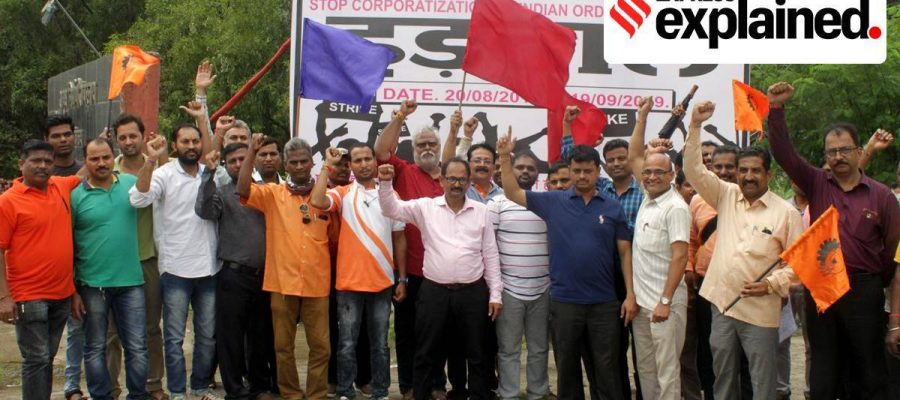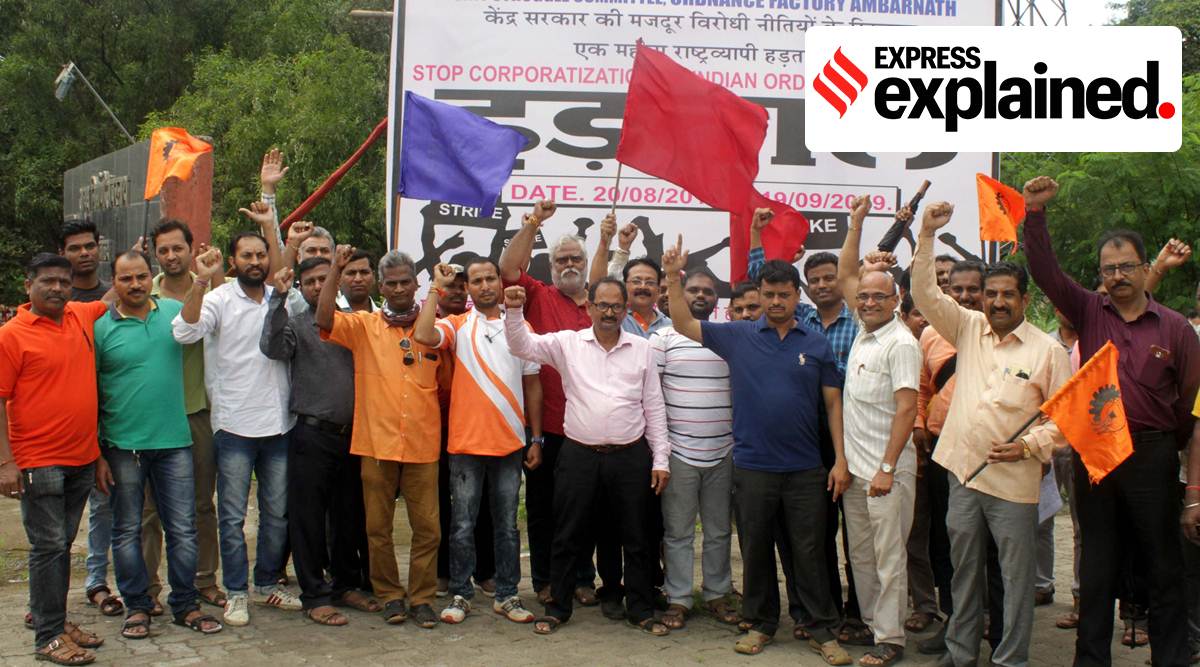The 220-year-old Ordnance Factory Board will be dissolved on October 1, and its units will be corporatised under seven PSUs. How and why did this come about, and what lies ahead?
The Ordnance Factory Board (OFB), the first of whose industrial establishments was set up in 1801, will cease to exist from October 1, and the assets, staff, and operations of its 41 ordnance factories will be transferred to seven defence public sector units (DPSUs).
Also in the OFB tent are nine training institutes, three regional marketing centres, and five regional controllers of safety. The government has gone through with the corporatisation in the face of strong opposition from workers’ federations, including the one affiliated to the RSS.
A large chunk of the weapons, ammunition, and supplies used by the armed forces, and paramilitary and police forces, come from OFB-run factories. Their products include civilian and military-grade arms and ammunition, explosives, propellants, and chemicals for missile systems, military vehicles, armoured vehicles, optical and electronic devices, parachutes, support equipment, troop clothing, and general store items for the armed forces.
Newsletter | Click to get the day’s best explainers in your inbox
For-against corporatisation
The restructuring of the Kolkata-headquartered OFB into corporate entities was recommended in one or the other form by at least three expert committees on defence reforms set up in the last two decades — the TKS Nair Committee (2000), Vijay Kelkar Committee (2005), and Vice Admiral Raman Puri Committee (2015). A fourth committee, constituted by former Defence Minister Manohar Parrikar and chaired by Lt Gen D B Shekatkar, did not suggest corporatisation, but recommended regular audits of all ordnance units considering past performance.
The central argument has been that corporatisation, which will bring these entities under the purview of The Companies Act, would lead to improvements in efficiency, make products cost-competitive, and enhance their quality.
It has been argued that OFB’s monopoly has led to innovation drying up, apart from low productivity, high costs of production, and lack of flexibility at the higher managerial levels.
Functioning directly under the Ministry of Defence, the OFB and its factories could not retain profits, and thus had no incentive to work towards increasing them, many have argued.
Discussions on restructuring with workers’ federations had failed to produce results on several occasions previously. Employees argued that corporatisation was a “move towards privatisation”. They expressed fears of job losses, and said a corporate entity would not be able to survive the unique market environment of defence products with its unstable demand-supply dynamics.
The federations have insisted the factories have been innovative, and have repeatedly proven their worth as a “war reserve”. Many OFB products are exported, they have argued.
Ordinance about ordnance
Corporatisation was listed as one of the 167 “transformative ideas” to be implemented in the first 100 days of the second Narendra Modi government in 2019. In May 2020, giving details of the fourth tranche of the Atmanirbhar Bharat initiative, Finance Minister Nirmala Sitharaman announced the decision to corporatise OFB for “improving autonomy, accountability and efficiency in ordnance suppliers”.
On September 10 last year, the government appointed a consortium led by KPMG Advisory Services as a strategy and implementation consultant for the proposed corporatisation. The following day, an Empowered Group of Ministers (EGoM) for Corporatisation was formed with Defence Minister Rajnath Singh as chairman “to oversee and guide the entire process, including transition support and redeployment plan of employees while safeguarding their wages and retirement benefits”.
In October 2020, the government declared a proposed strike by workers’ federations “invalid and illegal”. Following talks between the three federations and ministry officials, the workers deferred their plan for an indefinite strike. But as no reconciliation could be reached, the government announced this June that the OFB would be split into seven DPSUs.
With the federations adamant, the government brought an Essential Defence Services Ordinance (EDSO) at the end of July, which aimed primarily to stop workers of ordnance factories from going on strike.
Protests from workers
The almost 75,000 workers at the 41 factories and their allied units are mainly affiliated to three federations: the All India Defence Employees’ Federation (AIDEF), a federation of Left unions; the Indian National Defence Workers’ Federation (INDWF), affiliated to the Indian National Trade Union Congress (INTUC) of the Congress; and the Bharatiya Pratiraksha Mazdoor Sangh (BPMS), which is the part of the RSS’s Bharatiya Mazdoor Sangh (BMS).
From the time the government first proposed corporatisation in 2019, the three federations had formed an unlikely joint front. In one of their first representations to the defence minister in 2019, they said that converting the ordnance factories into a corporation was commercially unviable, and that “the experience of the past two decades is that corporatisation is a route to privatisation”.
The federations described the government’s decision of June 2021 as “good news for private corporations and foreign arms manufacturers”. In mid-July, however, the Congress’s INDWF said they would no longer oppose the corporatisation because the defence minister had promised that workers’ rights would be protected. The BPMS of the RSS and AIDEF of the Left refused to step back.
Seven successor DPSUs
The government has said that the OFB will be split into seven PSUs: Munitions India Ltd, Armoured Vehicles Nigam Ltd, Advanced Weapons and Equipment India Ltd, Troop Comforts Ltd, Yantra India Ltd, India Optel Ltd, and Gliders India Ltd. Each of these PSUs will run clusters of ordnance factories involved in manufacturing similar categories of products. Training and marketing establishments that have been part of the OFB will also be divided among the seven PSUs, officials have said.
On August 2, Minister of State for Defence Ajay Bhatt told Rajya Sabha in a written reply: “The employees…shall continue to be subjected to all rules and regulations as are applicable to the Central Government servants. Their pay scales, allowances, leave, medical facilities, career progression and other service conditions will also continue to be governed by the extant rules, regulations and orders, as are applicable to the Central Government servants. The pension liabilities of the retirees and existing employees will continue to be borne by the government.”
The BPMS and AIDEF have said October 1 will be marked as a Black Day. The report of a referendum, which shows the majority of workers are opposed to corporatisation, would be submitted to the defence minister, the federations have said. A petition in the Supreme Court against the law banning strikes is also in the works. Their fight will continue, even as the requirements of the armed forces are not allowed to suffer, the workers’ bodies have said.
According to the federations, the recent order worth Rs 7,523 crore to Heavy Vehicles Factory (HVF), Chennai for 118 units of the Main Battle Tank Arjun’s Mark-1A variant for the Army, is testimony to the reliability of the ordnance factories.
Source: Read Full Article



